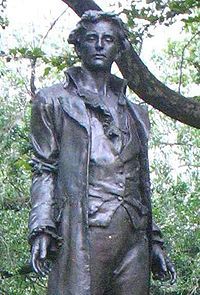“Punting the Pundits” is an Open Thread. It is a selection of editorials and opinions from around the news medium and the internet blogs. The intent is to provide a forum for your reactions and opinions, not just to the opinions presented, but to what ever you find important.
Thanks to ek hornbeck, click on the link and you can access all the past “Punting the Pundits”.
Justin Elliot: The criminalization of speech since 9/11
Last week, a 24-year-old Virginia man named Jubair Ahmad was arrested and charged with providing “material support” to an officially designated terrorist organization, the Pakistani group Lashkar-e-Taiba (LeT).
But Ahmad is not accused of sending money or weapons to LeT, or scouting out targets for the group. What had Ahmad allegedly done? Uploaded a “propaganda video to YouTube on behalf of LeT” that showed “so-called jihadi martyrs and armored trucks exploding after having been hit by improvised explosive devices,” according to the Justice Department. Ahmad allegedly had spoken to the son of an LeT figure about making the video.
The case is an example of prosecutors’ aggressive use, in the decade after Sept. 11, of the preexisting law that bars providing “material support” to officially designated terrorist groups. In a landmark case last year, the Supreme Court endorsed the government’s broad interpretation of the material-support law in a way that critics say criminalizes speech.
Charles R. Morris: How the rich blew up the banks
Gold is a traditional inflation hedge. Yet it has been hovering near record real levels, even as the economy careens toward an inflation-killing double-dip recession. Treasury rates are resolutely stuck at near-zero as the U.S. financial position goes to hell in a hand-basket. Watch for the skies to start raining frogs.
An intriguing paper by Zoltan Pozsar, a senior International Monetary Fund researcher, sheds a new light on this phenomena. A massive buildup of free cash in the hands of companies, hedge funds and rich individuals may be turning many of the canons of conventional banking on their heads.
Looking forward, what is the best and worst that we can expect in politics and economics?
Suppose President Obama’s jobs speech of last Thursday marks a turning point. He gets energized by being a little more partisan. He finds that putting Republicans on the defensive is good politics. His poll numbers improve. He wins some of his proposed jobs bill, and fights hard for the rest of it.
As unemployment remains persistently high going into an election year, he offers even stronger medicine. His base gets energized.
(Stay with me here, I know this is a bit wishful — it’s an exercise, a thought experiment, not a prediction — but the alternative is to just slit our wrists.)
As the election draws closer, voters take a closer look at what Republicans are actually offering and it isn’t very appetizing. Rick Perry, the likely GOP nominee, who has never faced tough media scrutiny, doesn’t wear well. He has trouble dancing away from the truly nutty stuff he has embraced in the recent past.
William Rivers Pitt: The Children of Aftermath
All across America, there are classrooms filled with fifth graders who only know the World Trade Center from pictures. They have achieved the final perfection of George Orwell’s vision – we have always been at war with Eurasia – because they have never known a world where their country has not been at war in Iraq and Afghanistan. As with the Towers, some of these children only know a parent from pictures, because that parent was killed in those wars. They know what anthrax is, what an IED is, what WMD stands for. They know about fear, for it was fed to them, literally, with mother’s milk. For them, it has always been this way.
These children have never known a country that was not in an economic recession, for their country’s economy has been tottering on its feet like a punch-drunk prizefighter for the last ten years. Theirs is a country that has always tapped phones in secret, always imprisoned people without trial or due process of law, always tortured, always lived in a cocoon of fear and hatred that serves to justify virtually any act, no matter how barbarous or criminal or wrong. Politicians, in their world, have always used threats of terrorism to frighten, to control, to change the subject, to win elections, and to make money for themselves and their friends. There are no consequences for such vicious acts. For these children, it has always been this way.
E. J. Dionne: How Much Has Obama Learned About Republicans?
Our political system is not accustomed to the kind of battle that is going on now. President Obama has been slow to adjust to it. The voters are understandably mystified and frustrated by it. In the meantime, the economy sits on the edge between stagnation and something worse.
The president’s speech to Congress and the Republican presidential debate last week should have taught us that we are no longer in the world of civics textbooks in which our political parties split their differences and arrive at imperfect but reasonably satisfactory solutions.
Leslie Savan: After Jobs Speech, We Ask-Yet Again-‘Where’s This Obama Been?’
After Obama’s populist-sounding jobs speech, it’s understandable that a lot of us are asking, “Where has this Obama been?” He exuded verve, not wonk; he pointed fingers at the GOP (though he still insists on running against “Congress,” making Dems seem as obstreperous as Repubs); and he hit the right angry-but-controlled tone. As Howard Fineman writes, “Friends and foes alike had to wonder watching him tonight: where has that Barack Obama been?”
Actually, that Barack Obama has been popping up from time to time all along-so fleetingly, though, that we keep asking the same question as if for the first time, in a sort of liberal’s version of 50 First Dates.
In July, when Obama talked tough at a press conference on the debt ceiling, TPM headlined a post “Where Has This Obama Been?”; a Huffpost commenter echoed, “Where has this Obama been all this time? Love it! I’m so damn in!”
William J. Astore: Education: Our True Homeland Security
Today’s students see education as a means to an end, the end being a respectable job with decent pay and benefits.
And who can blame them? With the national unemployment rate at 9.1 percent (a percentage that doesn’t include part-timers seeking full-time employment and those unemployed who have simply given up looking for jobs), students are understandably worried about career prospects.
Many college students are also worried about paying back their student loans; operating under such financial pressure, a focus on salary and the possibility of pay raises and promotions is hardly surprising.


 The Pentagon is the headquarters of the
The Pentagon is the headquarters of the  Welcome to the Stars Hollow Health and Fitness weekly diary. It will publish on Saturday afternoon and be open for discussion about health related issues including diet, exercise, health and health care issues, as well as, tips on what you can do when there is a medical emergency. Also an opportunity to share and exchange your favorite healthy recipes.
Welcome to the Stars Hollow Health and Fitness weekly diary. It will publish on Saturday afternoon and be open for discussion about health related issues including diet, exercise, health and health care issues, as well as, tips on what you can do when there is a medical emergency. Also an opportunity to share and exchange your favorite healthy recipes. 
 On this day in 1776, General George Washington asks for a volunteer for an extremely dangerous mission: to gather intelligence behind enemy lines before the coming Battle of Harlem Heights. Captain Nathan Hale of the 19th Regiment of the Continental Army stepped forward and subsequently become one of the first known American spies of the Revolutionary War.
On this day in 1776, General George Washington asks for a volunteer for an extremely dangerous mission: to gather intelligence behind enemy lines before the coming Battle of Harlem Heights. Captain Nathan Hale of the 19th Regiment of the Continental Army stepped forward and subsequently become one of the first known American spies of the Revolutionary War. On this day in 1776, the Continental Congress formally declares the name of the new nation to be the “United States” of America. This replaced the term “United Colonies,” which had been in general use.
On this day in 1776, the Continental Congress formally declares the name of the new nation to be the “United States” of America. This replaced the term “United Colonies,” which had been in general use.
Recent Comments